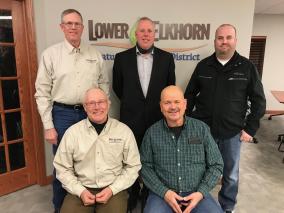Lower Elkhorn NRD: Managing Groundwater with Local Control and Solutions Key
Lower Elkhorn NRD: Managing Groundwater with Local Control and Solutions Key
NORFOLK, Nebraska -- There is a serious issue plaguing northeast Nebraska. The problem is nitrates in our groundwater. What can we do to rectify it?
The Lower Elkhorn Natural Resources District (LENRD) works with the citizens across their 15-county district to effectively conserve, develop, and manage natural resources with local control and local solutions. One of their 12 responsibilities is the development, management, utilization and conservation of groundwater.
The locally-led board of directors work continually to address the public’s concerns about the contamination of our groundwater. The NRDs were created along watershed boundaries to allow the public to work with the local boards to better address these issues. How much do we value our local control? Are we willing to work together to provide solutions to this problem? These are questions we must ask ourselves as we meet these challenges head on.
With 70 percent of Nebraskans relying on groundwater for their drinking water, sharing and sustaining the resource for future generations is paramount. The elevated levels of nitrates in our groundwater are spurring increased awareness and concern for the health of our citizens.
According to a recent study, birth defects on a national scale occur in 3.3 percent of all live births. Nebraska exceeds the national average with 5.8 percent. In Dodge and Pierce counties, however, the rate of birth defects is reaching as high as 14 percent. The counties with higher birth defects also have a greater prevalence of agrichemicals in the water, according to the study.
Health researchers are also gaining additional insight on the potential link between nitrate contamination in drinking water and Nebraska’s high rate of pediatric cancer. The high concentration of agrichemicals in drinking water have also been linked to additional adverse health risks, such as: colorectal cancer, thyroid cancer, stomach and kidney cancer, ovarian cancer, alzheimer’s, diabetes, and Parkinson’s disease.
During their February meeting, the LENRD Board continued to discuss the proposed Phase 2 Groundwater Management Area in Cuming, Colfax, and Dodge Counties, due to the rising levels of nitrates.
Nitrate is found naturally in the environment; however, evidence shows that excess nitrate comes primarily from the use of commercial fertilizers (both organic and manufactured). Nitrate dissolves readily in water and can easily transport beyond the root zone if unused by a growing crop, which contaminates groundwater.
“If you have ideas to help us slow down this train, please give us a call," said LENRD General Manager Mike Sousek. "This is about protecting our health and the health of our children and grandchildren. This is your water. The water that you drink. We are here to help you protect it.”
He added, “By working together at the local level, we can make changes today to protect the resources for tomorrow. It’s a matter of keeping our local control and moving in a direction that benefits everyone involved. No one wants the state or federal government to start making these local decisions for us.”
An Open House Public Hearing will be held on Thursday, March 25, in West Point at the Nielsen Center. This hearing will give the public a chance to stop by from 5-7 p.m. to learn more about the rising nitrate levels in the tri-county area. Groundwater users are encouraged to attend this public hearing to share their ideas about the proposed regulations for the Phase 2 Area and get their questions answered by the LENRD board and staff.
In other action the board instructed staff to advertise the construction bid documents for the Phase 1 – Willow Creek Dam Pore Pressure Mitigation Project, and to hold the bid opening on March 22.
The board also made a motion to advertise the request for proposals to develop a Floodplain Management Plan for the Willow Creek Dam, which is a requirement of the Federal Emergency Management Agency’s grant process.
The board authorized the general manager to sign a Cooperative Agreement with the Natural Resources Conservation Service (NRCS) to renew the long-standing commitment between the LENRD and NRCS to protect and conserve our natural resources.
The board ended their February meeting with the election of officers. The officers for 2021 are Chairman – Mark Hall, Norfolk; Vice-Chairman – Roger Gustafson, Emerson; Secretary – Jerry Allemann, Wayne; Treasurer – Dennis Schulz, Wisner; Nebraska Association of Resources Districts (NARD) Delegate – Joel Hansen, Wayne; and NARD Alternate – Scott McHenry, Norfolk.
Their next board meeting will be held Thursday, March 25, in West Point at the Nielsen Center. The meeting will he held immediately following the Open House Public Hearing on the proposed groundwater regulations. More information and maps of the Phase 2 Area can be found on the LENRD’s website or by contacting the LENRD office in Norfolk – http://www.lenrd.org/groundwater-management

